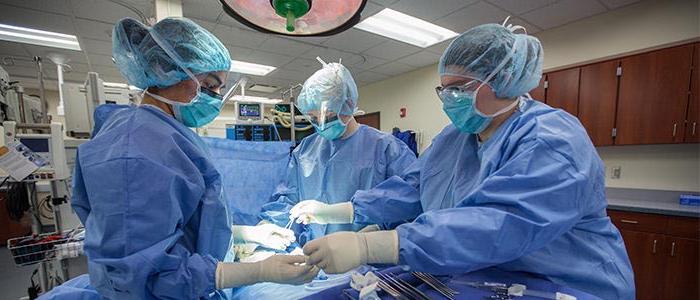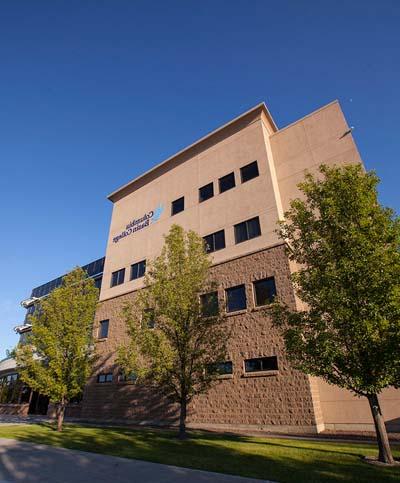Learning Domains & Goals
The Columbia Basin College Surgical Technology Program is accredited by the Commission
on Accreditation of Allied Health Education Programs (CAAHEP) under review by the
Accreditation Review Council on Education in Surgical Technology and Surgical Assisting
(ARC/STSA). See below for the educational domains as required in accordance with both
programmatic accreditation and the Core Curriculum for Surgical Technology, 6th edition.
Learning Domains
- Cognitive
- Psychomotor
- Affective

Goals
The primary goal of the Columbia Basin College Surgical Technology Program is to prepare
competent entry-level surgical technologists in the cognitive (knowledge), psychomotor
(skills), and affective (behavior) learning domains. In fulfilling this goal, the
surgical technology program exists to:
- Provide students with access to quality surgical technology education that will prepare
them for meaningful employment;
- Be responsive to the needs of the community in providing quality graduates who are
certified, properly trained and value continuing education;
- Promote faculty development and excellence in teaching; and
- Develop and maintain partnerships with local hospitals and clinics to facilitate student
learning and workforce development; and provide residents of South-eastern Washington,
Eastern Oregon and North-western Idaho with graduates of the surgical technology program
trained to be safe and meet the national standards for practice.
- Cognitive Domain: Students must complete course work in anatomy and physiology, and
apply the knowledge obtained as the basis for understanding theoretical surgical technology
concepts taught in subsequent quarters.
- Psychomotor Domain: Surgical technology laboratory courses incorporate the fundamentals
learned during science courses as students practice the motor skills associated with
operating room competencies.
- Affective Domain: Students learn to apply critical thinking skills, using knowledge
learned during basic biological science courses as the basis for decisions made during
the performance of operating room procedures.
- Cognitive Domain: Students learn the pronunciation, spelling and meaning of the most
commonly used medical terms in preparation for application within the surgical setting.
- Psychomotor Domain: Practical application of words and abbreviations in operative
reports and documentation is practiced and assessed in the laboratory classes and
during clinical rotations.
- Affective Domain: Students learn that the appropriate use of medical terminology promotes
professionalism and identity as a member of the surgical team.
- Cognitive Domain: Students are introduced to the concepts of professionalism, ethics
and values. Knowledge regarding ethical issues forms the framework for safe and ethical
practice. Promotion of the profession at the state and national level is emphasized
throughout the program. Cultural competency concepts are reinforced throughout the
program to provide students with the tools needed to practice culturally competent
care.
- Psychomotor Domain: Students practice and are assessed for their application of professional
attributes in the classroom, laboratory and clinical rotations.
- Affective Domain: The concepts of professionalism are taught to guide student behavior
in the profession of surgical technology. Interactive assignments where students discuss
and challenge each other facilitate students’ understanding of their own frame of
reference, enabling students to understand how their cultural and ethical mindset
impacts their interactions with patients and the surgical team.
- Cognitive Domain: Students are introduced to the concepts of surgical conscience,
accountability, and legal implications of one’s actions. These concepts are reinforced
in every course throughout the program as they are fundamental to the profession.
- Psychomotor Domain: Students practice and are assessed for their application of surgical
conscience and accountability in the classroom, laboratory and clinical rotations.
Legal concepts, such as charting and compliance with confidentiality, are also assessed
in laboratory simulations and during clinical rotations.
- Affective Domain: The concepts of surgical conscience, accountability, and legal implications
are taught to guide student behavior in the profession of surgical technology.
- Cognitive Domain: Surgical Technology courses (prefix SURG) at 网赌正规真人实体在线平台 are designed to
provide students with the theoretical basis to prepare for and assist with surgical
interventions. Knowledge gained is sequential, progressing from the simple to the
complex, enabling students to evolve from simple comprehension of theoretical material
to application of complex skills.
- Psychomotor Domain: During laboratory courses and clinical rotations, students progressively
apply theoretical surgical technology concepts in the performance of surgical technology
competencies.
- Affective Domain: Knowledge gained in 网赌正规真人实体在线平台 SURG courses prepare students for the emotional
challenges that may be encountered before, during and after surgical interventions.
- Cognitive Domain: Surgical Technology laboratory and clinical courses (prefix SURG)
at 网赌正规真人实体在线平台 are designed to provide students with the practical skills to prepare for and
assist with surgical interventions. Knowledge gained is sequential, progressing from
the simple to the complex, enabling students to evolve from simple comprehension of
theoretical material to application of complex skills.
- Psychomotor Domain: During laboratory courses and clinical rotations, students progressively
apply skills in the performance of surgical interventions.
- Affective Domain: Knowledge gained in 网赌正规真人实体在线平台 SURG laboratory and clinical courses prepare
students for entry-level practice as a surgical technologist.
- Cognitive Domain: Surgical Technology courses (prefix SURG) at 网赌正规真人实体在线平台 are designed to
provide students with the theoretical basis to prepare for and assist with surgical
interventions. Knowledge gained is sequential, progressing from the simple to the
complex, enabling students to evolve from simple comprehension of theoretical material
to application of complex skills.
- Psychomotor Domain: During laboratory courses and clinical rotations, students progressively
apply the concept of prioritization and critical thinking skills in the performance
of surgical technology competencies.
- Affective Domain: Students learn to apply critical thinking skills, using knowledge
learned during core courses, as the basis for decisions made during the performance
of operating room procedures and basic perioperative patient care.
Clinical Case requirements are the competencies required during surgical rotations. Student case requirements
are necessary in order to graduate from the 网赌正规真人实体在线平台 Surgical Technology program.


